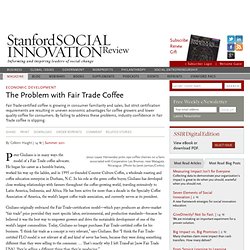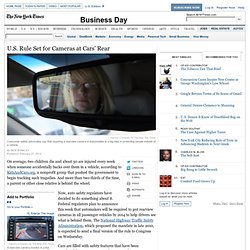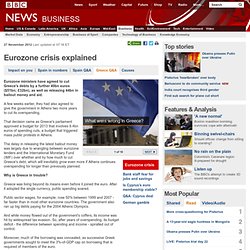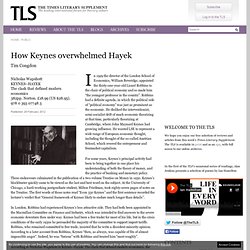

The Problem with Fair Trade Coffee. Fair Trade-certified coffee is growing in consumer familiarity and sales, but strict certification requirements are resulting in uneven economic advantages for coffee growers and lower quality coffee for consumers.

By failing to address these problems, industry confidence in Fair Trade coffee is slipping. Jesus Lopez Hernandez picks ripe coffee cherries on a farm associated with Cooperativo Las Brumas, near Matagala, Nicaragua. (Photo by Janet Jarman/Corbis) Peter Giuliano is in many ways the model of a Fair Trade coffee advocate. He began his career as a humble barista, worked his way up the ladder, and in 1995 co-founded Counter Culture Coffee, a wholesale roasting and coffee education enterprise in Durham, N.C. Giuliano is among a growing group of coffee growers, roasters, and importers who believe that Fair Trade-certified coffee is not living up to its chief promise to reduce poverty. UK consumers go bananas for Fairtrade. Sales of fairly traded products have bucked the trend of decline in the UK retail market to grow by 12% in the last year. The value of Fairtrade products sold through shops reached £1.32bn in 2011, compared to £1.17bn in 2010, according to figures from the Fairtrade Foundation, as it launches its annual marketing fortnight on Monday.
Unlike other premium sectors such as the organic market, which have lost ground as consumers struggle with the combination of rising food and energy prices and stagnant incomes, the Fairtrade market has continued to expand. The growth largely reflects a move among major supermarkets to sell Fairtrade goods at the same price as conventionally produced equivalents. Alternatively they have switched whole ranges to the Fairtrade sector rather than pass on the premium paid to farmers as a higher cost to consumers. U.S. Rule Set for Cameras at Cars’ Rear. Now, auto safety regulators have decided to do something about it.

Federal regulators plan to announce this week that automakers will be required to put rearview cameras in all passenger vehicles by 2014 to help drivers see what is behind them. The , which proposed the mandate in late 2010, is expected to send a final version of the rule to Congress on Wednesday. Cars are filled with safety features that have been mandated by government regulators over the years, including air bags and the Liddy Light, the third brake light named for Elizabeth Dole, who made it standard as secretary of transportation in the 1980s.
But the rearview camera requirement is one of the biggest steps taken to protect people outside of a vehicle. “We haven’t done anything else to protect pedestrians,” said Clarence Ditlow, executive director of the Center for Auto Safety in Washington. Untitled. Farewell To James Q. Wilson, The Most Accomplished Social Scientist Of The Last Half-Century. Q&A: Greek debt crisis. 27 November 2012Last updated at 07:16 ET Continue reading the main story What went wrong in Greece?

Greece's economic reforms, which led to it abandoning the drachma as its currency in favour of the euro in 2002, made it easier for the country to borrow money. Greece went on a big, debt-funded spending spree, including paying for high-profile projects such as the 2004 Athens Olympics, which went well over its budget. The country was hit by the downturn, which meant it had to spend more on benefits and received less in taxes. There were also doubts about the accuracy of its economic statistics. Greece's economic problems meant lenders started charging higher interest rates to lend it money. There have been demonstrations against the government's austerity measures to deal with its debt, such as cuts to public sector pay and pensions, reduced benefits and increased taxes. In 2010, the EU, IMF and ECB agreed a bailout worth 110bn euros (£92bn; $145bn) for Greece. Police privatisation plans defended by senior officers.
Senior police officers have strongly defended the radical extension of the role of private companies in policing, saying they should be involved in protecting the public and bringing offenders to justice. Book Review: Free Market Fairness. How Keynes overwhelmed Hayek. Tim Congdon Nicholas WapshottKEYNES–HAYEKThe clash that defined modern economics382pp.

Norton. £18.99 (US $28.95).978 0 393 07748 3 Published: 29 February 2012. Book Review: Free Market Fairness. French Socialists on course to score absolute majority in parliament. Opinion / EU fisheries: little learned 20 years later. BRUSSELS - EU ministers will gather in Brussels on Tuesday (12 June) for a crucial vote on the general approach for the reform of the Common Fisheries Policy (CFP).

The EU is sending its fleets to fish deeper and further out at sea (Photo: Bruno de Giusti) The developments of these last few weeks indicate that the European Parliament - the Council of Ministers' equal partner for the first time on fisheries issues - has already shown much more ambition than many national governments. Indeed, the direction of the council's discussions is worrying. A meeting last month clearly showed that that only a very small minority of member states is truly willing and ready to transform fisheries management in Europe. European Economic Confidence Beats Estimates. Economic confidence in the euro area improved more than forecast in February, adding to signs the economy is stabilizing after a fourth-quarter contraction. An index of executive and consumer sentiment in the 17- nation euro area rose for a second month, increasing to 94.4 from 93.4 in January, the European Commission in Brussels said today.
Economists had forecast a gain to 94, the median of 31 estimates in a Bloomberg News survey showed. Germany’s economy, Europe’s largest, has helped soften the impact of tougher austerity measures across the region as companies boost output and hiring to meet export demand. German business confidence rose more than economists forecast to a seven-month high in February and investors became more optimistic. European Central Bank President Mario Draghi has said that while some euro-area nations may see a “mild” recession, the overall situation “seems to be stabilizing.”
German Unemployment. Goodbye, Keynes! Pakistan’s policy managers need to switch their economic theorist.

John Maynard Keynes was a British economist whose ideas have profoundly affected the theory and practice of modern macroeconomics, as well as the economic policies of governments. PHOTO: AFP.